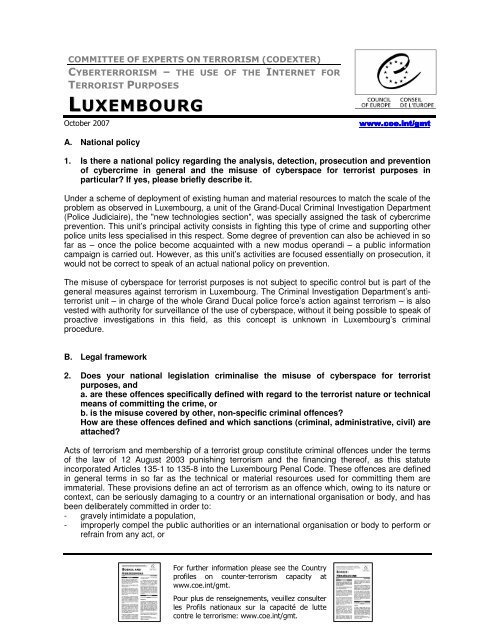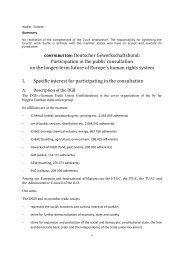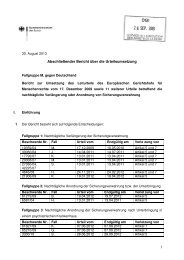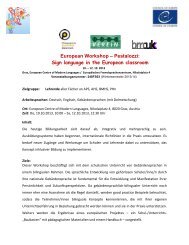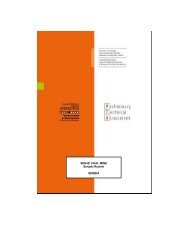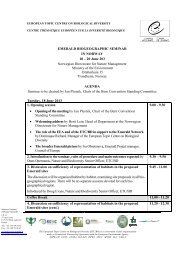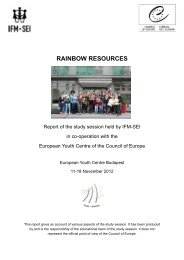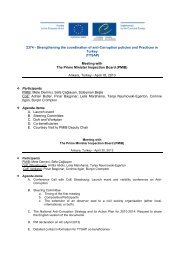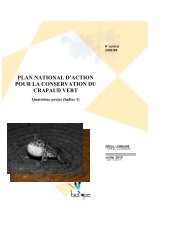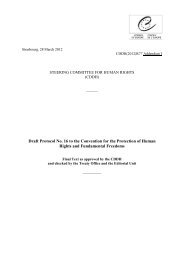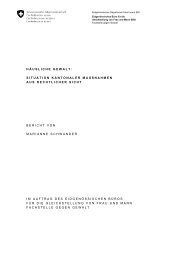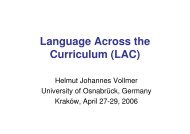LUXEMBOURG - Council of Europe
LUXEMBOURG - Council of Europe
LUXEMBOURG - Council of Europe
You also want an ePaper? Increase the reach of your titles
YUMPU automatically turns print PDFs into web optimized ePapers that Google loves.
COMMITTEE OF EXPERTS ON TERRORISM (CODEXTER)<br />
CYBERTERRORISM – THE USE OF THE INTERNET FOR<br />
TERRORIST PURPOSES<br />
<strong>LUXEMBOURG</strong><br />
For further information please see the Country<br />
pr<strong>of</strong>iles on counter-terrorism capacity at<br />
www.coe.int/gmt.<br />
Pour plus de renseignements, veuillez consulter<br />
les Pr<strong>of</strong>ils nationaux sur la capacité de lutte<br />
contre le terrorisme: www.coe.int/gmt.<br />
Kapitel 1<br />
October 2007 www.coe.int/gmt<br />
www.coe.int/gmt<br />
A. National policy<br />
1. Is there a national policy regarding the analysis, detection, prosecution and prevention<br />
<strong>of</strong> cybercrime in general and the misuse <strong>of</strong> cyberspace for terrorist purposes in<br />
particular? If yes, please briefly describe it.<br />
Under a scheme <strong>of</strong> deployment <strong>of</strong> existing human and material resources to match the scale <strong>of</strong> the<br />
problem as observed in Luxembourg, a unit <strong>of</strong> the Grand-Ducal Criminal Investigation Department<br />
(Police Judiciaire), the "new technologies section", was specially assigned the task <strong>of</strong> cybercrime<br />
prevention. This unit’s principal activity consists in fighting this type <strong>of</strong> crime and supporting other<br />
police units less specialised in this respect. Some degree <strong>of</strong> prevention can also be achieved in so<br />
far as – once the police become acquainted with a new modus operandi – a public information<br />
campaign is carried out. However, as this unit’s activities are focused essentially on prosecution, it<br />
would not be correct to speak <strong>of</strong> an actual national policy on prevention.<br />
The misuse <strong>of</strong> cyberspace for terrorist purposes is not subject to specific control but is part <strong>of</strong> the<br />
general measures against terrorism in Luxembourg. The Criminal Investigation Department’s antiterrorist<br />
unit – in charge <strong>of</strong> the whole Grand Ducal police force’s action against terrorism – is also<br />
vested with authority for surveillance <strong>of</strong> the use <strong>of</strong> cyberspace, without it being possible to speak <strong>of</strong><br />
proactive investigations in this field, as this concept is unknown in Luxembourg’s criminal<br />
procedure.<br />
B. Legal framework<br />
2. Does your national legislation criminalise the misuse <strong>of</strong> cyberspace for terrorist<br />
purposes, and<br />
a. are these <strong>of</strong>fences specifically defined with regard to the terrorist nature or technical<br />
means <strong>of</strong> committing the crime, or<br />
b. is the misuse covered by other, non-specific criminal <strong>of</strong>fences?<br />
How are these <strong>of</strong>fences defined and which sanctions (criminal, administrative, civil) are<br />
attached?<br />
Acts <strong>of</strong> terrorism and membership <strong>of</strong> a terrorist group constitute criminal <strong>of</strong>fences under the terms<br />
<strong>of</strong> the law <strong>of</strong> 12 August 2003 punishing terrorism and the financing there<strong>of</strong>, as this statute<br />
incorporated Articles 135-1 to 135-8 into the Luxembourg Penal Code. These <strong>of</strong>fences are defined<br />
in general terms in so far as the technical or material resources used for committing them are<br />
immaterial. These provisions define an act <strong>of</strong> terrorism as an <strong>of</strong>fence which, owing to its nature or<br />
context, can be seriously damaging to a country or an international organisation or body, and has<br />
been deliberately committed in order to:<br />
- gravely intimidate a population,<br />
- improperly compel the public authorities or an international organisation or body to perform or<br />
refrain from any act, or
2<br />
- severely destabilise or destroy the fundamental political, constitutional, economic or social<br />
structures a country or an international organisation or body.<br />
A further requirement is that this "basic <strong>of</strong>fence" should be punishable by a prison sentence or<br />
heavier custodial penalty <strong>of</strong> at least three years’ maximum duration.<br />
In addition, Luxembourg’s criminal law contemplates certain other <strong>of</strong>fences in the data processing<br />
field (Articles 509-1 to 509-7 <strong>of</strong> the Penal Code). Some <strong>of</strong> these <strong>of</strong>fences – such as tampering with<br />
a computer system – are liable to penalties that fulfil the criteria <strong>of</strong> the basic <strong>of</strong>fence under the<br />
antiterrorist provisions, and may thus be regarded as acts <strong>of</strong> terrorism.<br />
The provisions criminalising terrorist acts are formulated as follows:<br />
Chapter III-1.- On terrorism.<br />
(L. 12 August 2003)<br />
Article 135-1. (L. 12 August 2003)<br />
Any crime or <strong>of</strong>fence punishable by a maximum term <strong>of</strong> imprisonment <strong>of</strong> three years or more,<br />
or by a heavier penalty, shall constitute an act <strong>of</strong> terrorism where its nature or context is such<br />
that it may do serious harm to a country or an international organisation or body and has been<br />
deliberately committed in order to:<br />
- gravely intimidate a population,<br />
- improperly compel the public authorities or an international organisation or body to<br />
perform or refrain from any act, or<br />
- severely destabilise or destroy the fundamental political, constitutional, economic or social<br />
structures a country or an international organisation or body.<br />
Article 135-2. (L. 12 August 2003)<br />
Perpetrators <strong>of</strong> an act <strong>of</strong> terrorism as provided above shall be punished by fifteen to twenty<br />
years’ imprisonment.<br />
They shall be imprisoned for life where the act has caused one or more fatalities.<br />
Article 135-3. (L. 12 August 2003)<br />
A terrorist group is constituted by an organised association <strong>of</strong> more than two persons lastingly<br />
established in order to commit, in a concerted manner, one or more <strong>of</strong> the acts <strong>of</strong> terrorism<br />
referred to in Articles 135-1 and 135-2.<br />
Article 135-4. (L. 12 August 2003)<br />
(1) Anyone who intentionally and wittingly is an active member <strong>of</strong> a terrorist group shall be<br />
punished by one to eight years’ imprisonment and a fine <strong>of</strong> 2 500 to 12 500 euros, or by one <strong>of</strong><br />
these penalties alone, even if not intending to commit an <strong>of</strong>fence within that group or to<br />
associate with it as principal or accomplice.<br />
(2) Anyone who participates in preparing or carrying out any lawful activity <strong>of</strong> the aforesaid<br />
terrorist group in the knowledge that his or her participation furthers its aims as defined above<br />
shall be punished by one to eight years’ imprisonment and/or a fine <strong>of</strong> 2 500 to 12 500 euros.<br />
(3) Anyone who participates in any decision-making in connection with the activities <strong>of</strong> a<br />
terrorist group in the knowledge that his or her participation furthers its aims as defined above<br />
shall be punished by five to ten years’ imprisonment and/or a fine <strong>of</strong> 12 500 to 25 000 euros.<br />
(4) Any leader <strong>of</strong> a terrorist group shall be punished by ten to fifteen years’ imprisonment<br />
and/or a fine <strong>of</strong> 25 000 to 50 000 euros.
3<br />
(5) Where acts referred to in paragraphs 1 to 4 above occur within the national territory, the<br />
culprits shall be prosecuted in accordance with the law <strong>of</strong> Luxembourg irrespective <strong>of</strong> where<br />
the terrorist group is based or engages in its activities.<br />
Article 135-5. (L. 12 August 2003)<br />
It constitutes an act <strong>of</strong> financing terrorism to provide or to raise by any means whatsoever,<br />
whether directly or indirectly, illegally and intentionally, funds, assets or wealth <strong>of</strong> any kind with<br />
the intention or in the knowledge that they will be wholly or partially used to commit one or<br />
more <strong>of</strong> the <strong>of</strong>fences provided for in Articles 135-1 to 135-4 and 442-1, even if they have not<br />
actually been used to commit one <strong>of</strong> these <strong>of</strong>fences.<br />
Article 135-6. (L. 12 August 2003)<br />
Persons who have committed an act <strong>of</strong> financing terrorism as provided above shall incur the<br />
same penalties as are prescribed by Articles 135-1 to 135-4 and 442-1, and according to the<br />
distinctions drawn therein.<br />
Article 135-7. (L. 12 August 2003)<br />
Exemption from punishment shall apply to persons who, before any attempt to commit<br />
<strong>of</strong>fences defined in Articles 135-1, 135-2, 135-5 and 135-6 and before any proceedings have<br />
been instituted, disclose to the authorities that acts are afoot to prepare for the commission <strong>of</strong><br />
<strong>of</strong>fences defined under the aforementioned provisions, or the identities <strong>of</strong> the perpetrators <strong>of</strong><br />
such acts.<br />
In the same cases, the severe prison sentences applicable shall be reduced in the proportions<br />
determined by Article 52 and according to the scale prescribed therein for persons who, after<br />
proceedings are instituted, disclose to the authorities the identities <strong>of</strong> hitherto unidentified<br />
culprits.<br />
Article 135-8. (L. 12 August 2003)<br />
Exemption from punishment shall apply to persons guilty <strong>of</strong> participating in a terrorist group<br />
who, before any attempt to commit acts <strong>of</strong> terrorism for which the group exists and before any<br />
proceedings have been instituted, disclose to the authorities the existence <strong>of</strong> that group and<br />
the names <strong>of</strong> its principal or subordinate leaders.<br />
Common provision in respect <strong>of</strong> this title.<br />
Article 136.<br />
Exemption from the penalties for <strong>of</strong>fences <strong>of</strong> conspiracy punishable under the terms <strong>of</strong> this title<br />
and for the <strong>of</strong>fences prescribed in Article 111 shall apply to culprits who, before any attack and<br />
before any proceedings are instituted, inform the authorities <strong>of</strong> such conspiracies or <strong>of</strong>fences,<br />
and <strong>of</strong> the perpetrators there<strong>of</strong> or accomplices therein.<br />
In addition, the definitions <strong>of</strong> <strong>of</strong>fences relating to computer crimes under the Penal Code provide as<br />
follows:
Section VII.4 – On <strong>of</strong>fences in the field <strong>of</strong> data processing.<br />
(L. 15 July 1993)<br />
Article 509-1. (L. 14 August 2000)<br />
4<br />
Anyone who has fraudulently gained or maintained access to all or part <strong>of</strong> an automated data<br />
processing or transmission system shall be punished by two months to two years <strong>of</strong><br />
imprisonment and/or a fine <strong>of</strong> 500 to 25 000 euros.<br />
When this access results in the deletion or alteration <strong>of</strong> data contained in the system, or in<br />
impairment <strong>of</strong> its operation, the term <strong>of</strong> imprisonment shall be four months to two years and<br />
the fine 1 250 to 25 000 euros.<br />
Article 509-2. (L. 15 July 1993)<br />
Anyone who deliberately or in contempt <strong>of</strong> the rights <strong>of</strong> others has impeded or tampered with<br />
the operation <strong>of</strong> an automated data processing or transmission system shall be punished by<br />
three months to three years <strong>of</strong> imprisonment and/or a fine <strong>of</strong> 1 250 to 12 500 euros.<br />
Article 509-3. (L. 14 August 2000)<br />
Anyone who deliberately or in contempt <strong>of</strong> the rights <strong>of</strong> others has directly or indirectly fed data<br />
into an automated processing or transmission system or deleted or altered the data which it<br />
contains or the methods <strong>of</strong> processing or transmitting such data shall be punished by three<br />
months to three years <strong>of</strong> imprisonment and/or a fine <strong>of</strong> 1 250 to 12 500 euros.<br />
Article 509-4. (L. 10 November 2006)<br />
Where, in the cases contemplated in Articles 509-1 to 509-3, money or monetary value has<br />
been transferred so as to cause a third party a loss <strong>of</strong> possession with the aim <strong>of</strong> securing an<br />
economic advantage to the person committing the <strong>of</strong>fence or to any other person, the penalty<br />
incurred shall be four months to five years <strong>of</strong> imprisonment and a fine <strong>of</strong> 1 250 to 30 000<br />
euros.<br />
The same penalties shall apply to persons who have produced, received, procured, held, sold<br />
or transferred to a third party s<strong>of</strong>tware intended to make an <strong>of</strong>fence referred to in the foregoing<br />
sub-paragraph materially possible.<br />
Article 509-5. Repealed (L. 14 August 2000).<br />
Article 509-6. (L. 15 July 1993)<br />
An attempt to commit the <strong>of</strong>fences provided for in Articles 509-1 to 509-5 shall be punishable<br />
by the same penalties as an actual <strong>of</strong>fence.<br />
Article 509-7. (L. 15 July 1993)<br />
Anyone who has participated in an association or conspiracy formed for the preparation,<br />
effected by one or more material acts, <strong>of</strong> one or more <strong>of</strong>fences prescribed by Articles 509-1 to<br />
509-5 shall incur the penalties prescribed for the actual <strong>of</strong>fence or for the most severely<br />
punished <strong>of</strong> the potential <strong>of</strong>fences.<br />
3. Do you plan to introduce new legislation to counter terrorist misuse <strong>of</strong> cyberspace?<br />
What are the basic concepts <strong>of</strong> these legislative initiatives?<br />
At the present stage it is not planned to adopt new statutory provisions, particularly because the<br />
cases met with in practice have not revealed any legislative deficiencies.
5<br />
4. What are the existing national practices in the field <strong>of</strong> detecting, monitoring and closing<br />
down websites used for illicit, in particular, terrorist purposes and what kind <strong>of</strong> national<br />
procedures allow the blocking <strong>of</strong> access to web sites or pages considered illicit?<br />
As regards the detection and monitoring aspect, reference is made to the reply to question 1.<br />
It is possible to close down websites based in Luxembourg if the publications posted on them<br />
constitute criminal <strong>of</strong>fences. Closure is the measure designed to put an end to the <strong>of</strong>fence. Closure<br />
is thus possible during the phase <strong>of</strong> court investigation on the investigating judge’s order.<br />
If the site is located abroad, a request for judicial assistance must be made by Luxembourg, and<br />
the outcome depends on the decisions taken by the competent authorities <strong>of</strong> the requested<br />
country.<br />
Where Luxembourg is the requested country, it suffices that the <strong>of</strong>fence charged also constitutes<br />
an <strong>of</strong>fence under the law <strong>of</strong> Luxembourg.<br />
5. What are the existing national practices in the field <strong>of</strong> interception <strong>of</strong>, or infiltration to,<br />
the electronic correspondence (e.g. e-mail, forum, instantaneous message service,<br />
voice over IP -skype, etc).<br />
National practices are determined by law (Code <strong>of</strong> Criminal Investigation), the relevant excerpt<br />
from which is reproduced below, at the end <strong>of</strong> this reply. From a statutory standpoint, Luxembourg<br />
has an instrument suited to present-day technical possibilities. It is self-evident that in practice, the<br />
police – and the State intelligence service as the case may be – are faced with the same technical<br />
problems as the corresponding departments <strong>of</strong> other states, in particular the rapid development <strong>of</strong><br />
technology, efficient encoding tools, etc.<br />
Section VIII. - Special surveillance measures.<br />
Article 88-1. (L. 26 November 1982)<br />
The investigating judge may, as an exceptional measure and by a decision expressly<br />
substantiated according to the facts <strong>of</strong> the case and with reference to the conditions stated<br />
below, order the use <strong>of</strong> technical devices for surveillance and monitoring <strong>of</strong> all forms <strong>of</strong><br />
communication, if:<br />
a) the criminal proceedings concern an act <strong>of</strong> particular gravity carrying a maximum criminal<br />
sentence <strong>of</strong> two years or more <strong>of</strong> imprisonment, and if<br />
b) established facts bring the person subject to surveillance under suspicion either <strong>of</strong> having<br />
committed or participated in the <strong>of</strong>fence, or <strong>of</strong> receiving or sending information intended<br />
for or originating from the person charged with or suspected <strong>of</strong> the <strong>of</strong>fence; and if<br />
c) the ordinary methods <strong>of</strong> investigation prove ineffective owing to the nature <strong>of</strong> the facts and<br />
the special circumstances <strong>of</strong> the case.<br />
The measures ordered shall be lifted once they are no longer necessary. They shall cease<br />
automatically one month after the date <strong>of</strong> the order. They are nevertheless subject to<br />
extensions <strong>of</strong> one month each, although the total duration may not exceed one year, by<br />
reasoned order <strong>of</strong> the investigating judge, approved by the presiding judge <strong>of</strong> the chamber <strong>of</strong><br />
the court <strong>of</strong> appeal who is to rule within two days after receiving the order, the state counsel<br />
general’s submissions having been heard.<br />
These measures cannot be ordered in respect <strong>of</strong> a person charged after his or her first<br />
interview with the investigating judge, and any such measures ordered earlier shall<br />
automatically cease to operate at that date.<br />
These measures cannot be ordered in respect <strong>of</strong> a person who is bound by pr<strong>of</strong>essional<br />
secrecy within the meaning <strong>of</strong> Article 458 <strong>of</strong> the Penal Code, unless personally suspected <strong>of</strong><br />
having committed or abetted the <strong>of</strong>fence.
6<br />
The state counsel general may in all cases object to the orders <strong>of</strong> the investigating judge. The<br />
objection shall be made within two days after the date <strong>of</strong> the order. It shall be brought before<br />
the presiding judge <strong>of</strong> the chamber <strong>of</strong> the court <strong>of</strong> appeal who is to rule within two days after<br />
receiving the order, the state counsel general’s submissions having been heard.<br />
Article 88-2. (L. 30 May 2005)<br />
Decisions by which the investigating judge or the presiding judge <strong>of</strong> the chamber <strong>of</strong> the court<br />
<strong>of</strong> appeal have ordered surveillance and monitoring <strong>of</strong> telecommunications and postal<br />
correspondence shall be notified to the operators <strong>of</strong> the post and telecommunications services<br />
who shall carry them out forthwith.<br />
(L. 30 May 2005) These decisions and the action taken on them shall be recorded in a special<br />
register kept by each operator <strong>of</strong> post and telecommunications services.<br />
(L. 30 May 2005) Recorded telecommunications and correspondence, together with data or<br />
information obtained by the use <strong>of</strong> other technical surveillance and monitoring devices under<br />
Article 88-1, shall be handed over, with seals affixed and in return for a receipt, to the<br />
investigating judge who shall draw up a record <strong>of</strong> their delivery. The judge shall have copies<br />
made <strong>of</strong> all correspondence which may serve as prosecution or defence evidence, and file the<br />
copies, the recordings and all other data and information received. The judge shall send back<br />
any written correspondence whose seizure is not deemed expedient to the postal service<br />
providers, who shall deliver them promptly to the addressees.<br />
(L. 7 July 1989) Where the measures <strong>of</strong> surveillance and monitoring <strong>of</strong> communications<br />
ordered under Article 88-1 have had no result, the copies, recordings and all other data and<br />
information on file shall be destroyed by the investigating judge not later than twelve months<br />
after the order to discontinue the surveillance measures. Where the investigating judge<br />
considers that these copies or recordings, or the data or information received, may be <strong>of</strong> use<br />
for further investigation, he/she shall direct that they be kept on file by an order reasoned<br />
according to the facts <strong>of</strong> the case. The state counsel general and the person whose<br />
correspondence or telecommunications have been placed under surveillance, notified in<br />
accordance with sub-paragraph 6 below, may challenge the relevant order subject to the<br />
conditions stated in the last indent <strong>of</strong> Article 88-1. When the measures for surveillance and<br />
monitoring <strong>of</strong> communications ordered under Article 88-1 have led to a decision which has<br />
acquired res judicata force to discharge, acquit or convict the person charged, the copies and<br />
recordings together with all other data and information shall be destroyed by the state counsel<br />
general or the state prosecutor within one month after the date on which the court decision<br />
acquires res judicata force.<br />
(L. 30 May 2005) Communications with persons bound by pr<strong>of</strong>essional secrecy within the<br />
meaning <strong>of</strong> Article 458 <strong>of</strong> the Penal Code, not suspected <strong>of</strong> having personally committed or<br />
abetted the <strong>of</strong>fence, cannot be used. Recordings and transcriptions <strong>of</strong> them shall be destroyed<br />
forthwith by the investigating judge.<br />
(L. 7 July 1989) A person whose correspondence or telecommunications have been placed<br />
under surveillance shall be informed <strong>of</strong> the measure ordered not later than twelve months after<br />
the termination <strong>of</strong> the aforesaid measure.<br />
(L. 26 November 1982) After the first interview with the investigating judge, the person<br />
charged and the defence counsel may receive disclosure <strong>of</strong> the telecommunications recorded,<br />
the correspondence and all other data and information placed in the file.<br />
(L. 26 November 1982) The person charged and the defence counsel are entitled to have the<br />
recordings reproduced in the presence <strong>of</strong> a judicial police <strong>of</strong>ficer (Police Judiciaire).
Article 88-3. (L. 26 November 1982)<br />
7<br />
The President <strong>of</strong> the Government may, with the assent <strong>of</strong> a commission consisting <strong>of</strong> the<br />
presiding judges <strong>of</strong> the Supreme Court <strong>of</strong> Justice, the Administrative Court and the<br />
Luxembourg District Court, order the surveillance and monitoring, using appropriate technical<br />
devices, <strong>of</strong> all forms <strong>of</strong> communication for the purpose <strong>of</strong> detecting breaches <strong>of</strong> the State’s<br />
external security which one or more culprits are attempting to commit or have committed or<br />
attempted to commit, if the ordinary methods <strong>of</strong> investigation prove ineffective owing to the<br />
nature <strong>of</strong> the facts and the special circumstances <strong>of</strong> the case.<br />
(L. 7 November 1996; L. 8 June 1999; L. 15 June 2004) In urgent cases, the President <strong>of</strong> the<br />
Government may on his/her own authority order the surveillance and monitoring referred to in<br />
the foregoing sub-paragraph, but shall diligently consult the commission provided for therein,<br />
which shall decide whether or not the surveillance and monitoring should be maintained.<br />
Surveillance and monitoring shall cease immediately the required information has been<br />
obtained, and not later than three months after the date on which the measures were ordered.<br />
Surveillance and monitoring may, with the assent <strong>of</strong> the commission, be ordered by the<br />
President <strong>of</strong> the Government for a further period <strong>of</strong> three months. The decision <strong>of</strong> the<br />
President <strong>of</strong> the Government shall be renewable at intervals <strong>of</strong> three months on the same<br />
terms.<br />
Should any member <strong>of</strong> the commission be unavailable, the presiding judge <strong>of</strong> the Supreme <strong>of</strong><br />
Court <strong>of</strong> Justice shall be replaced by a member <strong>of</strong> the Court <strong>of</strong> Cassation and the presiding<br />
judges <strong>of</strong> the Administrative Court and <strong>of</strong> the Luxembourg District Court by a member <strong>of</strong> the<br />
<strong>Council</strong> <strong>of</strong> State’s litigation board.<br />
Article 88-4. (L. 30 May 2005)<br />
Decisions whereby the President <strong>of</strong> the Government has ordered surveillance and monitoring<br />
<strong>of</strong> telecommunications and correspondence shall be notified to the post and<br />
telecommunications service operators, who shall carry them out forthwith.<br />
(L. 26 November 1982) Surveillance and monitoring <strong>of</strong> telecommunications shall be performed<br />
by the intelligence service instituted by the law <strong>of</strong> 30 July 1960 concerning the guarding <strong>of</strong><br />
secrets affecting the external security <strong>of</strong> the State.<br />
(L. 26 November 1982) Communications with persons bound by pr<strong>of</strong>essional secrecy within<br />
the meaning <strong>of</strong> Article 458 <strong>of</strong> the Penal Code and not personally suspected <strong>of</strong> attempting to<br />
commit or <strong>of</strong> having committed or attempted to commit the <strong>of</strong>fence as principal or accomplice<br />
may not be used. Recordings and transcriptions <strong>of</strong> such communications shall be immediately<br />
destroyed by the head <strong>of</strong> the intelligence service.<br />
(L. 30 May 2005) Correspondence shall be handed over with seals affixed and in return for a<br />
receipt to the intelligence service. The head <strong>of</strong> the intelligence service shall have photocopies<br />
made <strong>of</strong> correspondence which may serve as prosecution or defence evidence and shall send<br />
back any written correspondence whose retention is not deemed expedient to the post and<br />
telecommunications service operators, who shall have it delivered to the addressee.<br />
(L. 26 November 1982) Where the measures <strong>of</strong> surveillance and monitoring <strong>of</strong><br />
communications implemented under Article 88-3 have had no result, the copies, recordings<br />
and all other data and information obtained shall be destroyed by the head <strong>of</strong> the intelligence<br />
service.<br />
Where these copies, recordings, data or information may be <strong>of</strong> use for further investigation,<br />
destruction shall take place by the time prosecution becomes subject to limitation.
8<br />
6. Does your national legislation provide criteria for establishing jurisdiction over the<br />
misuse <strong>of</strong> cyberspace for terrorist purposes? What are those criteria?<br />
Jurisdiction is apportioned by Luxembourg’s judicial organisation in two judicial districts,<br />
Luxembourg and Diekirch. However, where terrorism and money laundering are concerned, the<br />
legislator (Article 26 (2) <strong>of</strong> the Code <strong>of</strong> Criminal Investigation) has consolidated judicial authority<br />
around the judicial district <strong>of</strong> Luxembourg. The criterion for establishing jurisdiction is thus the<br />
nature <strong>of</strong> the <strong>of</strong>fence irrespective <strong>of</strong> the seriousness <strong>of</strong> the acts or the territorial aspects.<br />
7. Does your national legal system establish additional <strong>of</strong>fences related to attempts at, or<br />
complicity in, the commission <strong>of</strong> the misuse <strong>of</strong> cyberspace for terrorist purposes<br />
(ancillary <strong>of</strong>fences)?<br />
The definition <strong>of</strong> an act <strong>of</strong> terrorism is such that there is no need for the "basic" <strong>of</strong>fences to have<br />
actually had their effects, since Article 135-1 <strong>of</strong> the Penal Code provides that: "Any crime or<br />
<strong>of</strong>fence punishable by a maximum term <strong>of</strong> imprisonment <strong>of</strong> three years or more, or by a heavier<br />
penalty, shall constitute an act <strong>of</strong> terrorism where its nature or context is such that it may do<br />
serious harm to a country or an international organisation or body (…)". Suffice it that they could<br />
have done serious harm.<br />
Moreover, as regards the basic <strong>of</strong>fences proper, the general rules <strong>of</strong> attempting to commit are<br />
applicable. In Luxembourg, an attempt to commit a crime is still punishable, as is an attempt to<br />
commit a lesser <strong>of</strong>fence where the legislation so provides.<br />
The rules on complicity are prescribed by Articles 66 to 68 <strong>of</strong> the Penal Code which provide as<br />
follows:<br />
Article 66.<br />
The following are punishable as perpetrators <strong>of</strong> a crime or lesser <strong>of</strong>fence:<br />
Those who carried it out or directly co-operated in carrying it out;<br />
Those who, by any act whatsoever, have rendered such assistance in carrying out the act that<br />
without it the crime or <strong>of</strong>fence could not have been committed;<br />
Those who by means <strong>of</strong> gifts, promises, threats, abuse <strong>of</strong> authority or power, culpable<br />
machinations or deceit, have <strong>of</strong>fered direct incitement to that crime or <strong>of</strong>fence;<br />
(L. 8 June 2004) Those who, whether through statements made in meetings or in public<br />
places, or through placards or posters, or through writings whether or not printed and sold or<br />
distributed, have <strong>of</strong>fered direct incitement to commit the crime or <strong>of</strong>fence, subject to the last<br />
two provisions <strong>of</strong> Article 22 <strong>of</strong> the law <strong>of</strong> 8 June 2004 on freedom <strong>of</strong> expression in the media.<br />
Article 67.<br />
The following are punishable as accomplices in a crime or lesser <strong>of</strong>fence:<br />
Those who issued instructions to commit it;<br />
Those who obtained weapons, instruments or any other means employed for the crime or<br />
<strong>of</strong>fence, knowing that they were to be so employed;<br />
Those who, except in the case prescribed by paragraph 3 <strong>of</strong> Article 66, have wittingly aided or<br />
abetted the culprit or culprits <strong>of</strong> the crime or <strong>of</strong>fence in the acts by which it was prepared or<br />
facilitated, or the acts by which it was committed.<br />
Article 68.<br />
Persons who, being acquainted with the criminal behaviour <strong>of</strong> the malefactors engaging in<br />
extortion or violence detrimental to the security <strong>of</strong> the State, in breach <strong>of</strong> the peace or against<br />
persons or property, have habitually afforded them a place <strong>of</strong> abode, refuge or assembly, shall<br />
be punished as their accomplices.
9<br />
8. What kind <strong>of</strong> national procedures do you have for submitting an application on the<br />
activities <strong>of</strong> Internet-providers and/or hosting companies or other entities, to deprive a<br />
user from a domain name or to cancel his/her/its registration or licence?<br />
In Luxembourg, management <strong>of</strong> the geographic first level domain LU is handled as a public service<br />
by the Réseau Téléinformatique de l’Education Nationale et de la Recherche (RESTENA) (remote<br />
processing network for national education and research).<br />
This service commenced at the time when Luxembourg’s first physical connection to the Internet<br />
was made and authority for first level domain was assigned to RESTENA by the Internet Assigned<br />
Numbers Authority (IANA) in March 1992. 1<br />
Access to the WHOIS service <strong>of</strong> RESTENA DNS-LU is allowed for any person wishing to obtain<br />
information on a domain name stored in the LU database. RESTENA DNS-LU supplies the data<br />
therein solely for purposes <strong>of</strong> consultation, and RESTENA DNS-LU does not guarantee their<br />
accuracy. This information cannot be used in full or even in part for compilation, distribution or any<br />
other purpose without the prior written permission <strong>of</strong> RESTENA DNS-LU. 2<br />
Apart from this service intended for every individual, the standard procedures for gathering<br />
information in police or judicial investigations may be applied.<br />
Deprivation <strong>of</strong> the use <strong>of</strong> a domain name and cancellation <strong>of</strong> registration are matters governed by<br />
civil law in most instances. A judicial ruling will be implemented by RESTENA which has no<br />
independent power to rule in disputes between two individuals claiming the same right <strong>of</strong><br />
ownership for a domain name.<br />
Use <strong>of</strong> a domain name may, however, also be a criminal law matter, particularly as regards<br />
infringement <strong>of</strong> the legislation on intellectual property and protected trademarks or where the use<br />
<strong>of</strong> a domain name would be immoral. In this case, cancellation <strong>of</strong> a domain name would also<br />
depend on a judicial ruling. In some circumstances, cancellation during the judicial investigation<br />
would be conceivable to put an end to the <strong>of</strong>fence. Here, the decision would rest with the<br />
investigating authorities.<br />
9. What non-legislative measures do you have in your country to prevent and counter<br />
terrorist misuse <strong>of</strong> cyberspace, including self-regulatory measures?<br />
The state authorities only hold powers vested in them by law. In that sense, all measures are<br />
legislative measures in one way or another. In the absence <strong>of</strong> further particulars as to the exact<br />
purport <strong>of</strong> this question, it is not possible to give a more detailed reply.<br />
C. International co-operation<br />
10. Please describe your country's general framework for international co-operation<br />
regarding the misuse <strong>of</strong> cyberspace for terrorist purposes.<br />
The general provisions on international co-operation are applicable to cyberterrorism, in particular<br />
the <strong>Council</strong> <strong>of</strong> <strong>Europe</strong> Convention on Mutual Assistance in Criminal Matters <strong>of</strong> 20 April 1959, the<br />
<strong>Council</strong> <strong>of</strong> <strong>Europe</strong> Convention on Extradition <strong>of</strong> 13 December 1957 and the relevant <strong>Europe</strong>an<br />
Union instruments. In relation to other countries, monitoring is usually implemented on the basis <strong>of</strong><br />
a search warrant issued by an investigating magistrate. That said, on the basis <strong>of</strong> a reasoned<br />
order, special means <strong>of</strong> surveillance may be designated by an investigating judge, allowing an<br />
Internet screening operation which targets a given login to be set up. This procedure is also<br />
applicable for combating terrorist movements that misuse cyberspace for their own ends.<br />
1 Le système des noms de domaine d'Internet, Antoine Barthel, Théo Duhautpas, Marc Hensel RESTENA,<br />
http://www.dns.lu/Pdfs/News_paper1999.pdf.<br />
2 http://www.dns.lu/en/EN-LUChercher.html.
10<br />
11. What are the existing practices and experiences with regard to international cooperation,<br />
in particular in relation to the procedures described in question 4?<br />
The law enforcement authorities do not perform any proactive monitoring <strong>of</strong> the Internet. Only on<br />
finding an <strong>of</strong>fence covered by the specific provisions <strong>of</strong> the Penal Code on terrorism can the<br />
investigating judge to whom the case is referred issue an order requiring the access provider or the<br />
host <strong>of</strong> the incriminated site to take blocking and/or closure measures. As regards experiences <strong>of</strong><br />
collaboration with foreign police departments in this field, the cases dealt with in this way principally<br />
concerned national investigations focused on the storage or dissemination <strong>of</strong> child pornography,<br />
whereas it has not yet been possible to acquire experience in measures to block sites preaching<br />
terrorism.<br />
D. Institutional framework<br />
12. Please list the institutions that are competent for countering terrorist misuse <strong>of</strong><br />
cyberspace.<br />
The competent institutions are the judicial authorities (prosecution department and investigating<br />
judges) and the Grand-Ducal Police Force. Within the police they are, more specifically, the judicial<br />
police department (Police Judiciaire) and in particular the Anti-Terrorist Unit <strong>of</strong> the General Crime<br />
Section in collaboration with the New Technologies Section for the technical side.<br />
13. In order to counter terrorist misuse <strong>of</strong> cyberspace are there any partnerships between<br />
the public and private sectors or legal obligations for operators <strong>of</strong> electronic<br />
communication (Internet-service providers, hosting companies, etc.) as well as persons<br />
providing the public with access to systems which allow on-line communication via<br />
access to the network (cyber cafe, WiFi hotspot)?<br />
At present there is no specific legal obligation as regards the use <strong>of</strong> cyberspace. Among the<br />
"ordinary" obligations in force in this respect, mention should be made <strong>of</strong> the law <strong>of</strong> 30 May 2005<br />
requiring providers in the communications sector to retain a certain number <strong>of</strong> pieces <strong>of</strong> information<br />
(see excerpt below).<br />
There is no formal partnership between the public and the private sectors, although the relevant<br />
police departments keep up excellent relations with the service providers and their co-operation is<br />
good on the whole.<br />
Law <strong>of</strong> 30 May 2005<br />
– on the specific arrangements to protect the individual as regards the processing <strong>of</strong><br />
personal data in the electronic communications sector, and<br />
– amending Articles 88-2 and 88-4 <strong>of</strong> the Code <strong>of</strong> Criminal Investigation<br />
Article 5. Data on traffic<br />
(1) (a) To meet the needs <strong>of</strong> detecting, determining and prosecuting criminal <strong>of</strong>fences, and for<br />
the sole purpose <strong>of</strong> allowing information to be made available as required to the judicial<br />
authorities, all service providers or operators processing data which relate to traffic are obliged<br />
to retain such data for a period <strong>of</strong> 12 months. A Grand-Ducal regulation shall determine the<br />
categories <strong>of</strong> traffic data which may be <strong>of</strong> use in detecting, determining and prosecuting<br />
criminal <strong>of</strong>fences.<br />
(b) After the period <strong>of</strong> retention prescribed in sub-paragraph (a) above, the service provider or<br />
operator shall delete or render anonymous the traffic data concerning the subscribers and<br />
users.<br />
(…)
Article 9. Location data other than traffic data<br />
11<br />
(1) (a) To meet the needs <strong>of</strong> detecting, determining and prosecuting criminal <strong>of</strong>fences, and<br />
for the sole purpose <strong>of</strong> allowing information to be made available as required to the judicial<br />
authorities, all service providers or operators processing location data other than traffic data<br />
are obliged to retain such data for a period <strong>of</strong> 12 months. For the purposes <strong>of</strong> this paragraph,<br />
a single indication <strong>of</strong> location shall be required for each communication or call. A Grand-Ducal<br />
regulation shall determine the categories <strong>of</strong> location data other than traffic data which may be<br />
<strong>of</strong> use in detecting, determining and prosecuting criminal <strong>of</strong>fences.<br />
14. Are there any hotlines regulated by the public or private sectors permitting<br />
denouncement <strong>of</strong> those web sites which could be <strong>of</strong> a terrorist character / nature?<br />
No.<br />
E. Statistical information<br />
15. Please provide relevant statistics on <strong>of</strong>fences relating to the misuse <strong>of</strong> cyberspace for<br />
terrorist purposes (including possibly: cases recorded, investigated, brought to court,<br />
convictions, victims etc.).<br />
No <strong>of</strong>fence relating to misuse <strong>of</strong> cyberspace for terrorist purposes has been detected in<br />
Luxembourg to date.<br />
16. Where possible, please describe briefly the pr<strong>of</strong>ile <strong>of</strong> <strong>of</strong>fenders typically involved in the<br />
misuse <strong>of</strong> cyberspace for terrorist purposes (pr<strong>of</strong>essional background, gender, age,<br />
nationality), and possible typical organisational characteristics, including trans-national<br />
links and links to other forms <strong>of</strong> organised crime.<br />
As Luxembourg has not as yet been confronted with this type <strong>of</strong> <strong>of</strong>fence, it is impossible to<br />
establish a criminal pr<strong>of</strong>ile as envisaged by this question.


